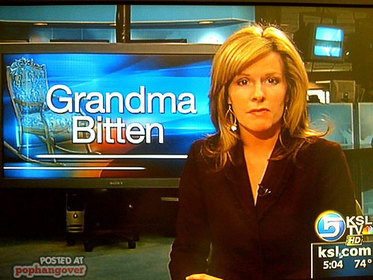
Most folks would say that it's important for them to get the news. On the other hand, most would bemoan the typical news media offering of the news. It tends to be mostly bad news. Media outlets seem to closely follow the old adage, "if it bleeds, it leads."
Folks seeking the news end up with sensationalism, gossip, and a lot of useless stuff that gains them very little new knowledge, understanding or awareness, something like the item being reported in the graphic on the left. The rare exception is public TV and radio which still values in-depth coverage and extended features.
Do we get the good news, particularly on Easter?
Looking at the unique account from the gospel of John, we find Mary going to the tomb on Easter morning alone, discovering that the stone has been rolled away.
She returns to tell the other disciples. This creates a new story line that follows a foot race to the tomb between Peter and the "beloved disciple" (who is never identified and only appears in John's gospel). Ultimately, they both enter the tomb. They see the clothes, but no corpse. It says that the "beloved disciple" 'saw and believed,' but says nothing about Peter's level of recognition. They leave, apparently thinking they knew something, but not apparently having gained any new knowledge, and not having much curiosity either.
The story returns to Mary who is again at the tomb and visibly distraught. She has no answers and seems determined to learn something about what has happened. Following an exchange with angels inside the tomb, she is met by the risen Lord outside the tomb. She get the good news from Jesus.
Do we get the good news of Easter? Or do we think we know that something important happened, but like the two guys, we don't really know what this all means?
There is no sermon video this week - sorry, Gail! With video camera running throughout the communion liturgy, the battery drained. When the battery died, the video in memory went with it.
But check out the sermon text and the Fairfielder answers provided for download below.
Folks seeking the news end up with sensationalism, gossip, and a lot of useless stuff that gains them very little new knowledge, understanding or awareness, something like the item being reported in the graphic on the left. The rare exception is public TV and radio which still values in-depth coverage and extended features.
Do we get the good news, particularly on Easter?
Looking at the unique account from the gospel of John, we find Mary going to the tomb on Easter morning alone, discovering that the stone has been rolled away.
She returns to tell the other disciples. This creates a new story line that follows a foot race to the tomb between Peter and the "beloved disciple" (who is never identified and only appears in John's gospel). Ultimately, they both enter the tomb. They see the clothes, but no corpse. It says that the "beloved disciple" 'saw and believed,' but says nothing about Peter's level of recognition. They leave, apparently thinking they knew something, but not apparently having gained any new knowledge, and not having much curiosity either.
The story returns to Mary who is again at the tomb and visibly distraught. She has no answers and seems determined to learn something about what has happened. Following an exchange with angels inside the tomb, she is met by the risen Lord outside the tomb. She get the good news from Jesus.
Do we get the good news of Easter? Or do we think we know that something important happened, but like the two guys, we don't really know what this all means?
There is no sermon video this week - sorry, Gail! With video camera running throughout the communion liturgy, the battery drained. When the battery died, the video in memory went with it.
But check out the sermon text and the Fairfielder answers provided for download below.
| 04-05-15-get_the_good_news-easter.pdf |
| 04-05-15-ff-answers.pdf |
